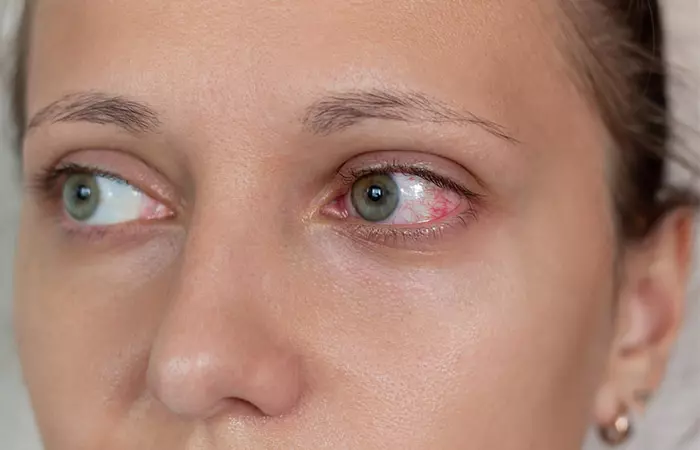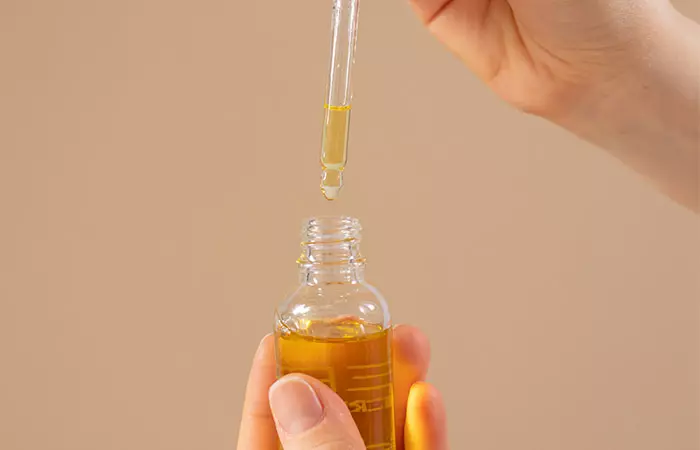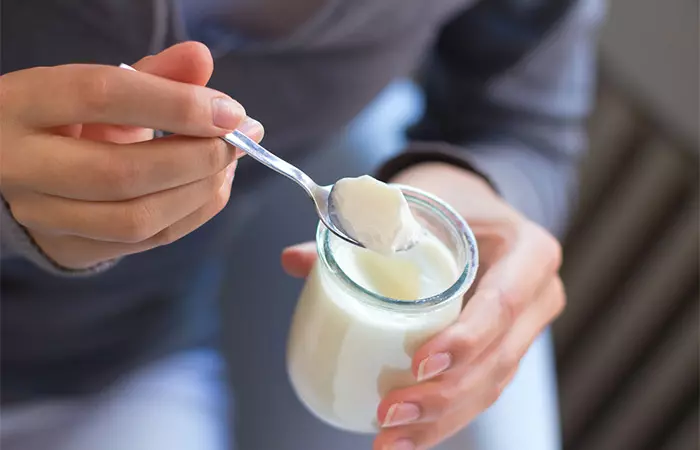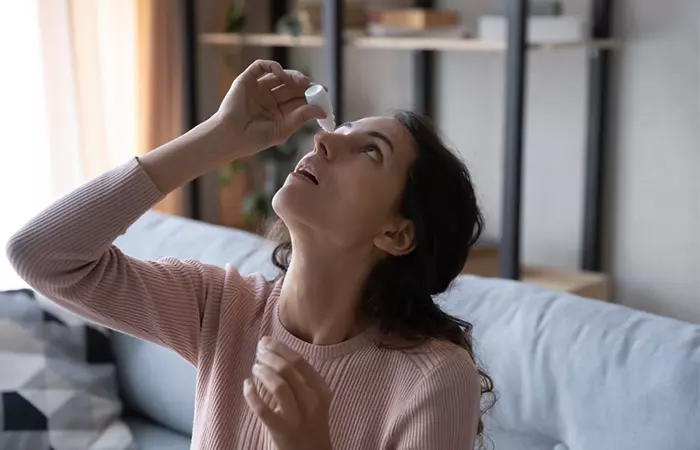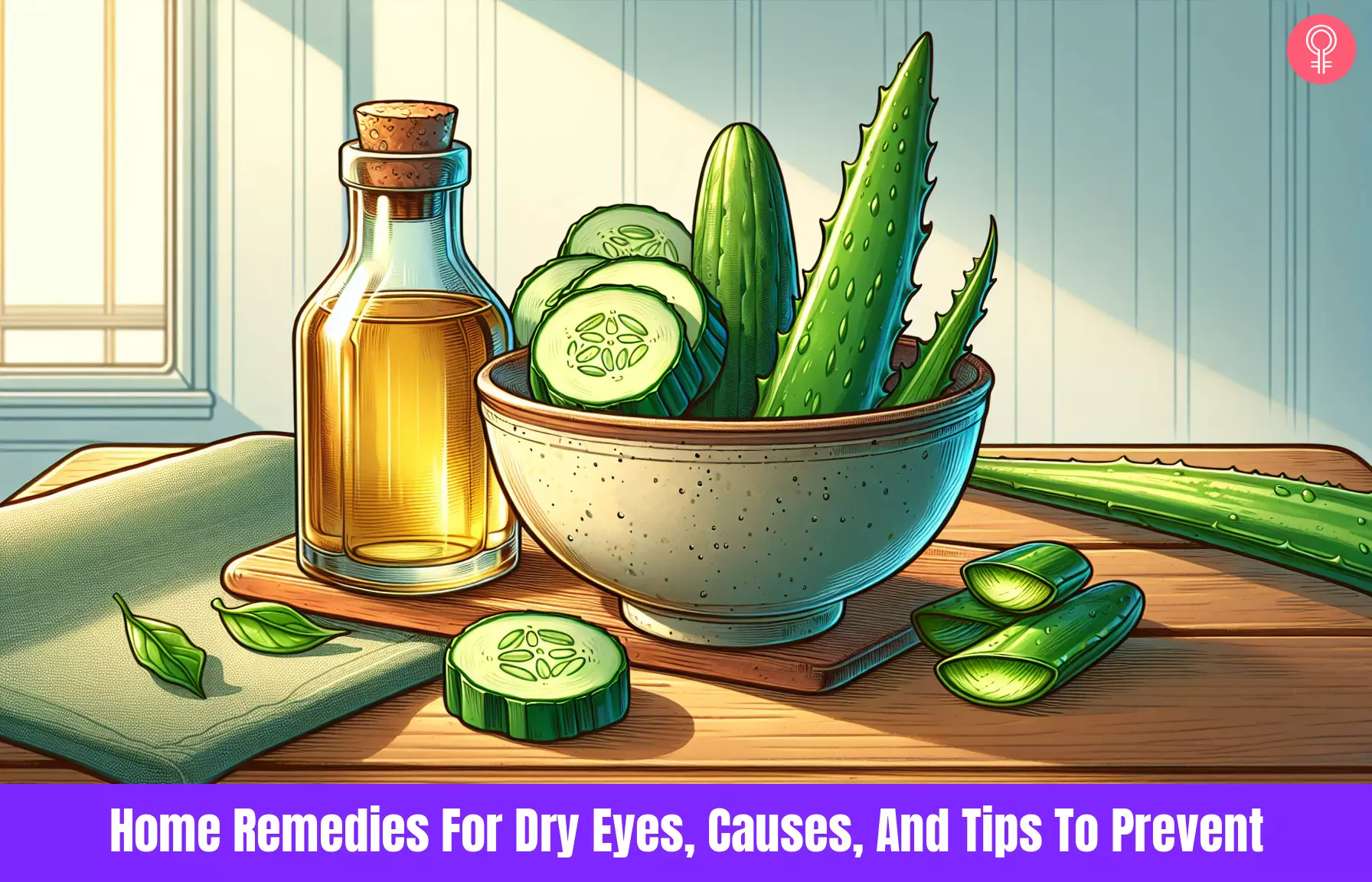What Is Dry Eye?
Dry eye is a condition in which an individual is unable to produce enough tears to lubricate or nourish the eyes. This condition is also referred to as dry eye syndrome or keratoconjunctivitis. Your eyes always need a layer of tears coating them to keep them lubricated and avoid the entry of dust, allergies, and other irritants. A lack of this layer can lead to dry eyes and irritation in the affected person’s eyes. Before we delve into the remedies, it’s important to understand the condition better. Read on to learn about the types of dry eyes.
Types Of Dry Eye Disease
Dry eye disease (DED) is a multifaceted condition that can be of several types, each exhibiting distinct characteristics (1), (2): Dry eyes could be a result of various factors. Some of the most common causes are discussed below.
What Causes Dry Eyes?
The common causes that lead to the drying of your eyes are:
Constant exposure to wind or dry air Dysfunctional tear glands Allergies Previous eye surgery Use of medications, such as antihistaminesi A class of drugs that help relieve symptoms of allergies like hay fever, common cold, and conjunctivitis. , decongestantsi Medicines that can provide short-term relief from a blocked or stuffy nose caused by cold or flu viruses. , contraceptive pills, or antidepressants Aging Not blinking for a long time Long-term use of contact lens Staring at the computer screen for too long A deficiency in vitamins A and D Hormonal therapy and pregnancy Medical conditions like hypothyroidism, allergies, arthritisi An inflammatory condition affecting the joints and the tissues around them, causing swelling, stiffness, and pain. , and immune system disorders
Symptoms Of Dry Eyes
The most common dry eye symptoms include:
A stinging and burning sensation in your eyes Pain in the eyes Eyes become irritated and red Unusual tearing of the eyes Blurry vision Eyes feel dry and sandy
Ashley Coates, a blogger, shared his experience of dry eyes and the way it has impacted his life in his blog. He said, “Facial sensitivity is getting ever more extreme and making it impossible to lie flat on a pillow, incredibly. A dull ache is accompanied by flashes of pain. Just touching parts of my face can be extremely sensitive (i).” Dry eyes are not only exasperating but can also interfere with your day to day life. Hence, it is best to get rid of this problem at the earliest. Given below is a list of home remedies that can help you treat dry eye and its symptoms safely.
15 Home Remedies For Dry Eyes
1. Castor Oil
Castor oil is derived by pressing the seeds of the castor plant (Ricinus communis), and it contains high levels of ricinoleic acid. This imparts naturally lubricating properties to it. It also acts as an anti-inflammatory agent that relieves the burning and itching associated with dry eyes (3), (4). 1-2 drops of cold-pressed, organic castor oil Do this 2-3 times daily.
2. Coconut Oil
Coconut contains fatty acids, like capric acid and lauric acid, that are beneficial for your skin. They are also extremely moisturizing and anti-inflammatory and can hence be used to provide instant lubrication to dry and itchy eyes (5). A few drops of 100% organic virgin coconut oil Do this every morning and night.
3. Vitamins And Nutrients
Dry eye syndrome can also be a result of any vitamin deficiency. Studies have proved that the deficiency of vitamins D, B12, and A is related to the development of the condition (6), (7), (8). Hence, include foods rich in these vitamins in your diet. Foods like egg yolks, orange juice, cereals, orange juice, carrots, spinach, broccoli, and butter are rich sources of vitamins D and A. You can also increase your intake of foods rich in omega-3 fatty acids, like sardines, salmon, mackerel, spinach, soybeans, and chia seeds. Omega-3 fatty acids boost the production of the lubricating layer of your eyes (9). You can also take supplements for these nutrients after consulting your doctor.
4. Cucumber
Cucumbers are widely used for treating dry eyes. They are rich in water that helps soothe your eyes (10). They also contain vitamin A, the topical application of which is a proven remedy for dry eyes (11). 1 cucumber Use the cucumber slices 2-3 times daily to relax and soothe your eyes. Alternatively, if you don’t have cucumber, potato slices are another remedy used for reducing puffiness around the eyes.
5. Chamomile Tea
Chamomile is a great way to relieve dry and inflamed eyes due to its relaxing and calming effects and natural anti-inflammatory and soothing properties (12), (13). It can help replenish the lost moisture in the eyes and reduce the irritation caused by the condition.
1 teaspoon of dried chamomile herb 1 cup of hot water Cotton pads
You can do this 3-4 times daily until you obtain relief.
6. Fennel Seeds Tea
Fennel seeds contain anethole, an organic compound. The presence of anethole, flavonoids, and phenolics imparts anti-inflammatory and soothing properties to fennel seeds (14), (15). The anti-inflammatory activities of fennel seeds can help in reducing the inflammation and irritability, and their soothing properties can be used to retain moisture in your eyes.
1 teaspoon of fennel seeds 1 cup of boiling water Cotton pads
Do this 2-3 times daily.
7. Yogurt
All dairy products, including yogurt, are known to benefit dry eyes. It is a rich source of B vitamins and vitamin D (16). The consumption of these vitamins is proven to improve and treat dry eye syndrome naturally. 1 cup of plain yogurt Have a cup of plain yogurt. Consume yogurt at least once daily.
8. Aloe Vera
The benefits of aloe vera are no secret. Aloe vera contains bioactive compounds like ethanol and ethyl acetate that exhibit anti-inflammatory and healing properties (17), (18). These properties can prove to be quite helpful in treating dry eye and its symptoms. In addition to this, aloe vera is also a natural antioxidant that can protect your eyes from free radical damage (19). Caution: Make sure that it does not get inside your eyes as it can irritate. Aloe vera gel Take a little aloe vera gel and apply it to your eyelids. Do this 2 times daily.
9. Essential Oils
a. Lavender Essential Oil
Lavender oil has anti-inflammatory, antioxidant, and analgesici A group of drugs, also called painkillers, which can relieve pain by selectively blocking nerve impulses. properties (20). Dry eyes often result in irritation, and lavender oil can provide instant soothing and relief from it.
3-4 drops of lavender essential oil 1 cup of warm water A clean washcloth
You can do this 2-3 times daily.
b. Chamomile Oil
The properties of chamomile essential oil are quite similar to that of chamomile tea. It has anti-inflammatory properties (21). The oil is also widely used to treat allergic skin conditions like dermatitis (22). Hence, it may help relieve dry eyes as well.
3-4 drops of chamomile oil 1 cup of warm water A clean washcloth
You can do this multiple times a day.
10. Olive Oil
Olive oil contains fatty acids, like oleic acid and linoleic acid (23). It also exhibits antioxidant and anti-inflammatory properties (24). Hence, it may help in lubricating and replenishing the lost moisture in your eyes and reduce irritation and inflammation. A few drops of virgin olive oil You can repeat this process 2-3 times daily.
11. Fish Oil
Fish oil is one of the best remedies to treat dry eyes naturally. It is a rich source of omega-3 fatty acids, which, as discussed earlier, help promote vision and retinal health (25), (26). However, make sure you consult your doctor before taking these supplements. 1000-1200 mg of fish oil supplements Consume two capsules of 1000-1200 mg fish oil capsules. Do this once daily.
12. Flaxseed Oil
Flaxseed oil is the richest source of omega-3 fatty acids. It contains alpha linoleic acid (ALA), which is converted into two different omega-3 acids, called eicosapentaenoic acid (EPA) and docosahexaenoic acid (DHA). Both these omega-3 fatty acids can help treat dry eye and its symptoms (27). A study found that supplementation with flaxseed oil(1-2 g/day) helped reduce dryness of the conjunctivai A thin membrane that lines the eyes and produces mucus and tears to keep them lubricated. in people with Sjögren’s syndrome (29). Sjögren’s syndrome is a condition characterized by dry eyes and mouth. You can also increase your intake of flaxseeds for added benefits. Flaxseed supplements are also available. It is recommended that you consult a physician before going ahead with flaxseed oil supplements.
13. Green Tea Extract
The topical application of green tea extract can help in treating dry eyes (29). The epigallocatechin gallate (EGCG) in green tea exhibits anti-inflammatory activities that can help inhibit the inflammation that often accompanies a dry eye. Green tea extract is also a natural antioxidant and can prevent further irritation of your eyes.
1-2 green tea bags 1 cup of hot water Cotton pads
You can do this multiple times daily.
14. Honey
Honey gels and eye drops are widely used to treat many ocular ailments (30). The antiseptic and anti-inflammatory properties of honey can help treat dry eyes and also prevent further infection (31). A study showed that honey eye drops could reduce the symptoms of dry eye in contact lens wearers (32).
1 tablespoon of 100% organic honey 1/2 cup of pre-boiled and cooled water
You can do this 2-3 times daily.
15. Hot Compress
The moisture and warmth of hot compresses can help increase the thickness of the tear film, thus relieving dry eyes (33).
A clean cloth A bowl of warm water
Do this multiple times daily. Caution: Many people use turmeric drops, rose water, witch hazel, calendula, and black currant seed oil for various eye ailments. However, these ingredients should only be used on recommendation by a doctor. While they may have moisturizing benefits, if used incorrectly these remedies may cause side effects. It is essential to not use random home ingredients in the eyes, as it can cause eye damage, irritation, adverse reaction, and vision damage. If these remedies do not offer relief even after continued use, consult your healthcare provider immediately to avoid any serious eye conditions. Ask your doctor for prescribed eye ointments or drops for immediate relief. These remedies can help you manage dry eyes with their natural healing properties. Listed below are a few preventive tips that can speed up your recovery and prevent the recurrence of this condition.
Best Tips For Preventing Dry Eyes
Avoid exposing your eyes to dry air and strong winds. Use a humidifier inside your house. Take breaks during long hours of visual activity to rest your eyes. Use artificial tears to keep your eyes moist. Avoid smoking. Avoid the glare coming from computers or cellphones. Use anti-glare glasses. Increase your intake of omega-3 rich foods. The skin around your eyes may also feel dry. If you are dealing with dry eyelids, dab a blend of milk, apple cider vinegar, and vitamin E oil on the sensitive skin area with a cotton ball. Milk has hydrating properties, apple cider is a well-known natural pH balancer, and vitamin E contains fatty acids and antioxidants that keeps skin youthful and moisturized.
What are the best eye drops for dry eyes? Using natural eye drops made with ingredients like castor oil or honey is the best and safe way to treat dry eyes. Can drinking water help with dry eyes? Yes, drinking enough water can help with dry eyes because this syndrome may also be a symptom of dehydration, especially in hot and dry weather. What foods are good for dry eyes? Foods like carrots, salmon, tuna, sardine, mackerel, and other foods rich in vitamin A and omega-3 fatty acids are good for dry eyes. Can dry eye affect your vision? Yes. In some cases, the condition can irritate your eyes to such an extent that you may experience blurred vision. How do blinking exercises help to relieve dry eyes and what are the steps involved? Blinking exercises may help improve our dry eyes by keeping the ocular surface lubricated. Thus, the more we blink the less dry our eyes are. To do this exercise, close your eyes and pause for 2 seconds before opening them, then close your again, pause for 2 seconds, squeeze your eyes before opening, and relax. Do this at least 10-20 times a day. Can certain lifestyle changes like reducing stress and getting adequate sleep help to manage dry eyes? Yes, lifestyle changes like reducing stress and getting adequate sleep may help manage dry eyes because a study has shown to affect a person’s sleep quality. Sleep deprivation may cause less tear secretion (34). Stress may be another cause of sleep deprivation, which may also aggravate dry eyes. To de-stress yourself, try a warm relaxing bath, meditation, deep breathing exercises, and journaling. You should get at least 7-8 hours of sleep daily.
Illustration: Home Remedies For Dry Eyes Causes And Tips To Prevent
Learn simple home remedies to help soothe dry eyes. Get relief from the discomfort of dry eyes with easy tips. Check the following video to learn more!
